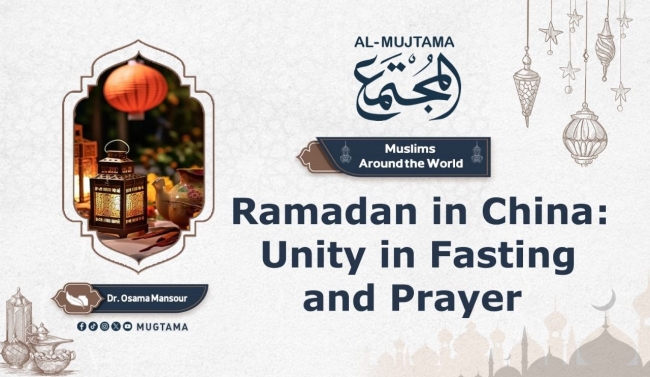Ramadan in China: Unity in Fasting and Prayer
Ramadan holds a uniqueness for the Muslims in China, as they make sure to pray, fast, and get closer to Allah the Almighty through righteous deeds such as charity, visiting relatives, and preparing iftar meals inside mosques. In Chinese, Ramadan is referred to as “Zhāi yuè,” meaning abstaining from food and drink for a sacred purpose.
Chinese Muslims also adorn their mosques with Chinese lanterns, flags, and banners welcoming the arrival of the holy month.
This year, Ramadan began on March 11th, according to the Chinese Islamic Association, which determines the beginning and end of the fasting month based on astronomical calculations, the Chinese lunar calendar, and the Islamic calendar. All 35 thousand mosques across China are notified of the beginning and end of the month so that Muslims can prepare for the sacred month.
Ramadan Crescent Moon
Muslims in China used to traditionally observe the Ramadan crescent inside mosques, where they dedicated a specific building called the “Crescent Observation Tower” for this purpose. Although circumstances have changed and modern devices are now used for moon sighting, the Islamic Association still determines the beginning and end of the month on behalf of the Muslim community. However, these buildings are still standing, bearing the same name, and still exist today, holding the same sanctity and reverence among Chinese Muslims.
Muslims prepare for this blessed month by fasting during its days, enduring the hardships of hunger and thirst in a society that knows little about Ramadan. Yet they seek rewards from Allah the Almighty.
After breaking their fast, Muslims gather, wearing white caps, at the nearest mosque from their homes to perform the Taraweeh prayers, exchanging greetings, congratulations, and supplications for a peaceful Ramadan.
Some mosques host iftar meals for Muslims every day during Ramadan, turning the time of breaking the fast into a gathering and entertainment for Muslims after a long fasting day.
During the Taraweeh prayer, Muslims perform twenty rak'ahs of prayers. Between each set of two rak'ahs, they repeat the du’a: “O Turner of the hearts and the eyes, O Creator of the night and the day” (three times). And between every four rak'ahs, they praise Allah Almighty, saying, “Glory be to the Master of dominion, of power, of Majesty; glory be to the King; He is living and does not die. Allah, the Most Glorious. The Most Holy. The Rubb of the Angels and of Jibril” (three times).
As for the Quranic ayahs recited during the Taraweeh prayers, they begin with Surah Al-Fil and end with Surah An-Nas (twice). After the completion of 18 rak'ahs, they say, “There is no God but Allah, the King, the Truth, the Manifest; Muhammad is the Messenger of Allah, the truthful, the trustworthy.” And after 20 rak'ahs, they say, “O Allah, we ask You for Paradise, and we seek Your protection from the Fire. O Glorious, O most merciful of the merciful ones.” After that, they perform the Witr prayer collectively, recite dhikr, and conclude with a supplication to Allah the Almighty.
Ramadan in various Chinese regions:
- In the capital Beijing:
You may not sense any religious vibes in the streets of Beijing during Ramadan, but in areas with Muslim gatherings, you can get strong Ramadan vibes in the streets and mosques adorned to celebrate the blessed month.
The 250,000 Muslims in Beijing consider Ramadan the happiest and most honorable month of the year, with most of them keen on fasting and spending the month in a peaceful, joyful, and harmonious atmosphere.
Niujie Street is the largest Muslim gathering place in Beijing, with around 20,000 Muslims residing there.
During Ramadan, over a thousand Muslims pray at Niujie Mosque, the largest mosque in Beijing. This historic mosque holds unforgettable memories during Ramadan, while Islamic shops and restaurants line both sides of the street.
- Ramadan in the Northwest:
Compared to the major cities of China, Ramadan in the northwest is more distinct and beautiful, where the majority of Muslims reside. In Ningxia, the vibes of Ramadan are clearer, especially around mosques. Before the Maghrib adhan, Muslims gather around iftar tables inside mosques, enjoying hot dishes, fresh fruits, sweets and pastries.
During prayers, mosques become crowded as worshippers perform the Taraweeh and Isha prayers, in a delightful scene that makes you feel like you're in an Arab country.
As for Qinghai in the far northwest, Muslims prepare for Ramadan with great anticipation, adorning mosques with lights and flags and gathering Muslims of various ethnicities and Quran memorizers to finish reciting it. Additionally, among the well-off Muslims of Qinghai, there is a noble tradition of inviting fellow Muslims to iftar in their homes, exchanging invitations throughout the month. These invitations serve as an opportunity to strengthen bonds of friendship and love among the Muslim community.
Many Muslims seek great reward during Ramadan, arranging gifts, material goods, and money to visit needy Muslims, orphans, and widows. They extend their care and concern to them with their support and attention.
- Ramadan in Southern China:
The vibes of Ramadan in southern China are not much different from those in the north. However, in some commercial cities, like Guangzhou and Yiwu, there's a distinct Arabic touch. These cities are home to many Arab expatriates, including traders and others, who celebrate this holy month with an atmosphere reminiscent of our Arab countries.
Arabic restaurants and shops offering traditional Arab Ramadan dishes like Knafeh, Qatayef, and fresh juices are widespread in these cities.
-------------------------------------------------------------


